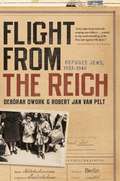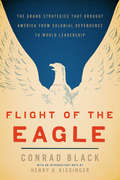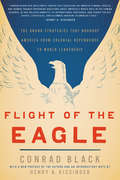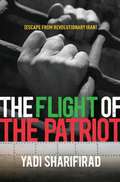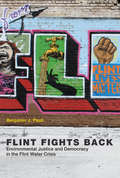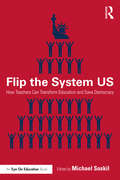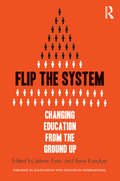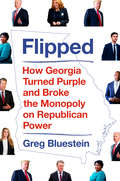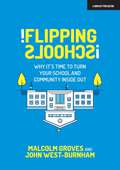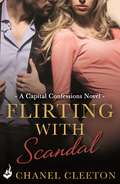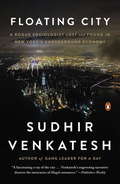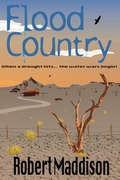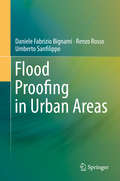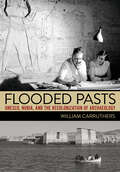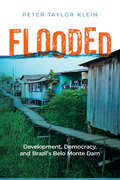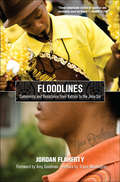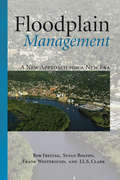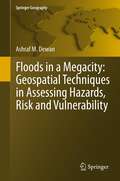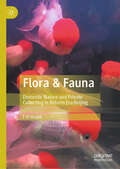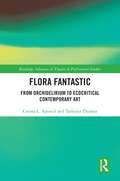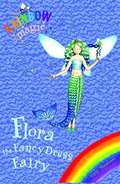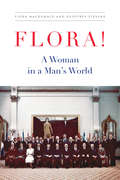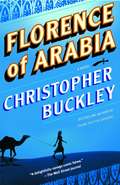- Table View
- List View
Flight from the Reich: Refugee Jews, 1933-1946
by Debórah Dwork Robert Jan van PeltAs persecution, war, and deportation savaged their communities, Jews tried to flee Nazi Europe through both legal and clandestine routes. In this riveting tale of Jewish refugees during and after the Nazi era, Debórah Dwork and Robert Jan van Pelt thread together official papers and personal accounts to weave the history of refugees’ lives into the history of the Holocaust.
Flight of the Eagle
by Conrad BlackLike an eagle, American colonists ascended from the gulley of British dependence to the position of sovereign world power in a period of merely two centuries. Seizing territory in Canada and representation in Britain; expelling the French, and even their British forefathers, American leaders George Washington, Benjamin Franklin, and Thomas Jefferson paved their nation's way to independence. With the first buds of public relation techniques-of communication, dramatization, and propaganda-America flourished into a vision of freedom, of enterprise, and of unalienable human rights.In Flight of the Eagle, Conrad Black provides a perspective on American history that is unprecedented. Through his analysis of the strategic development of the United States from 1754-1992, Black describes nine "phases" of the strategic rise of the nation, in which it progressed through grave challenges, civil and foreign wars, and secured a place for itself under the title of "Superpower." Black discredits prevailing notions that our unrivaled status is the product of good geography, demographics, and good luck. Instead, he reveals and analyzes the specific strategic decisions of great statesmen through the ages that transformed the world as we know it and established America's place in it.
Flight of the Eagle
by Conrad BlackLike an eagle, American colonists ascended from the gulley of British dependence to the position of sovereign world power in a period of merely two centuries. Seizing territory in Canada and representation in Britain; expelling the French, and even their British forefathers, American leaders George Washington, Benjamin Franklin, and Thomas Jefferson paved their nation's way to independence. With the first buds of public relation techniques-of communication, dramatization, and propaganda-America flourished into a vision of freedom, of enterprise, and of unalienable human rights.In Flight of the Eagle, Conrad Black provides a perspective on American history that is unprecedented. Through his analysis of the strategic development of the United States from 1754-1992, Black describes nine "phases" of the strategic rise of the nation, in which it progressed through grave challenges, civil and foreign wars, and secured a place for itself under the title of "Superpower." Black discredits prevailing notions that our unrivaled status is the product of good geography, demographics, and good luck. Instead, he reveals and analyzes the specific strategic decisions of great statesmen through the ages that transformed the world as we know it and established America's place in it.
Flight of the Patriot: Escape from Revolutionary Iran
by Yadollah SharifiradThis is a gripping, page-turning memoir of a US-trained Iranian fighter pilot who flew in the Shah of Iran’s and the Ayatollah Khomeini’s air force. Sharifirad was shot down in the Iraqi-Iranian war in the early 1990s. Saved by a group of local Kurds, he returned to Iran where he became a national hero. A movie, called Eagles, based on his rescue, was made in Iran in 1984. Sharifirad’s story was also published in Iran in a book called Crash on the Fortieth Mission. Shortly after his return to Iran, the Ayatollah sent him to Pakistan as military attaché. When he returned toTeheran, he was accused of being a CIA spy and was imprisoned, interrogated, and tortured. Sharifirad served a prison term and upon his release, despite constant surveillance, managed to smuggle his family out of the country. Eventually, he too managed a harrowing escape from Iran via Turkey to Canada, where he now lives with his family in Vancouver. The book also provides an absorbing historical and cultural backdrop to Iran.
Flint Fights Back: Environmental Justice and Democracy in the Flint Water Crisis (Urban and Industrial Environments)
by Benjamin J. PauliAn account of the Flint water crisis shows that Flint's struggle for safe and affordable water is part of a broader struggle for democracy.When Flint, Michigan, changed its source of municipal water from Lake Huron to the Flint River, Flint residents were repeatedly assured that the water was of the highest quality. At the switchover ceremony, the mayor and other officials performed a celebratory toast, declaring “Here's to Flint!” and downing glasses of freshly treated water. But as we now know, the water coming out of residents' taps harbored a variety of contaminants, including high levels of lead. In Flint Fights Back, Benjamin Pauli examines the water crisis and the political activism that it inspired, arguing that Flint's struggle for safe and affordable water was part of a broader struggle for democracy. Pauli connects Flint's water activism with the ongoing movement protesting the state of Michigan's policy of replacing elected officials in financially troubled cities like Flint and Detroit with appointed “emergency managers.”Pauli distinguishes the political narrative of the water crisis from the historical and technical narratives, showing that Flint activists' emphasis on democracy helped them to overcome some of the limitations of standard environmental justice frameworks. He discusses the pro-democracy (anti–emergency manager) movement and traces the rise of the “water warriors”; describes the uncompromising activist culture that developed out of the experience of being dismissed and disparaged by officials; and examines the interplay of activism and scientific expertise. Finally, he explores efforts by activists to expand the struggle for water justice and to organize newly mobilized residents into a movement for a radically democratic Flint.
Flip the System US: How Teachers Can Transform Education and Save Democracy
by Michael SoskilThis powerful and honest book uncovers how we can flip the system, building a more democratic, equitable, and cohesive society where teacher expertise drives solutions to education challenges. Editor Michael Soskil brings together a team of diverse voices to highlight solutions, spark positive change, and show us the path forward towards a more civil and more peaceful America. In each chapter, inspiring educators describe how we can create lasting and meaningful change by elevating teacher expertise; educating the whole child; increasing teacher morale; and fighting for all of our children to have equitable opportunity and quality schools.
Flip the System: Changing Education from the Ground Up
by René Kneyber Jelmer EversEducation is threatened on a global scale by forces of neoliberalism, through high stakes accountability, privatization and a destructive language of learning. In all respects, a GERM (Global Education Reform Movement) has erupted from international benchmark rankings such as PISA, TIMMS and PIRL, causing inequity, narrowing of the curriculum and teacher deprofessionalization on a truly global scale. In this book, teachers from around the world and other educational experts such as Andy Hargreaves, Ann Lieberman, Stephen Ball, Gert Biesta, Tom Bennett and many more, make the case to move away from this uneducational economic approach, to instead embrace a more humane, more democratic approach to education. This approach is called 'flipping the system', a move that places teachers exactly where they need to be - at the steering wheel of educational systems worldwide. This book will appeal to teachers and other education professionals around the world.
Flipped: How Georgia Turned Purple and Broke the Monopoly on Republican Power
by Greg BluesteinThe untold story of the unlikely heroes, the cutthroat politics, and the cultural forces that turned a Deep South state purple—by a top reporter at The Atlanta Journal-ConstitutionFlipped is the definitive account of how the election of Reverend Raphael Warnock and Jon Ossoff transformed Georgia from one of the staunchest Republican strongholds to the nation&’s most watched battleground state—and ground zero for the disinformation wars certain to plague statewide and national elections in the future. The Atlanta Journal-Constitution reporter Greg Bluestein charts how progressive activists and organizers worked to mobilize hundreds of thousands of new voters and how Joe Biden&’s victory in Georgia may shape Democratic strategy for years to come. He also chronicles how Georgia&’s Republicans countered with a move to the far right that culminated in state leaders defying Donald Trump&’s demands to overturn his defeat. Bluestein tells the story of all the key figures in this election, including Stacey Abrams, Brian Kemp, David Perdue, Jon Ossoff, Raphael Warnock, and Kelly Loeffler, through hundreds of interviews with the people closest to the election. Flipped also features such fascinating characters as political activist turned U.S. congresswoman Nikema Williams; perma-tanned baseball star turned lieutenant governor Geoff Duncan; and the volunteers and voters who laid the groundwork for Biden&’s triumphant Georgia campaign. Flipped tells a story that will resonate through the rest of the decade and beyond, as most political experts see Georgia headed toward years of close elections, and Democrats have developed a deep bench of strong candidates to challenge a still deeply entrenched GOP. Interest in the state only figures to increase if and when Stacey Abrams mounts a rematch against Governor Brian Kemp in the fall of 2022 and Trump promotes his own slate of candidates against Republicans who stood against his efforts to overturn Georgia&’s election.
Flipping Schools: Why it's time to turn your school and community inside out
by Malcolm Groves John West BurnhamThis brilliant book, focused on the education of the most vulnerable and disadvantaged children, offers a radical critique of traditional approaches to school improvement. The text argues for a movement away from the focus on social mobility to placing equity at the heart of school leadership. It suggests moving from improvement to social justice through a re-examination of the school's role in relation to its communities. The book is evidence-based and combines a focus on moral leadership with strategies to turn principle into practice.
Flipping Schools: Why it's time to turn your school and community inside out
by Malcolm Groves John West BurnhamThis brilliant book, focused on the education of the most vulnerable and disadvantaged children, offers a radical critique of traditional approaches to school improvement. The text argues for a movement away from the focus on social mobility to placing equity at the heart of school leadership. It suggests moving from improvement to social justice through a re-examination of the school's role in relation to its communities. The book is evidence-based and combines a focus on moral leadership with strategies to turn principle into practice.
Flirting With Scandal: Capital Confessions 1 (Capital Confessions #1)
by Chanel CleetonFrom the author of Next Year In Havana, a Reese Witherspoon's Book Club pick!A tantalising series that lovers of Scandal, House of Cards, and fans of Kristen Proby and Lauren Layne will be unable to resist. Prepare to be addicted to the love stories, seduction, secrets and lies in the city of scandal...Welcome to Washington, D.C., city of scandal, where no secret stays hidden for long... Jackie Gardner knows all about dirty little secrets. She's the illegitimate daughter of a powerful senator, determined to take the city by storm in her own right. A prestigious internship is her chance to shine - as long as her past stays buried.William Andrew Clayton was born for politics. He knows the drill: work hard, play discreetly, and avoid scandal like the plague - his glittering future and campaign depend on it. Sparks fly when Jackie and Will meet. With both careers at stake, and their every move stalked by a salacious blog - more than one secret is at risk of being exposed. As they cross the line from politics into passion, is what they have just another dirty secret? For more scandal and sizzling action, look out for the rest of the series - the deliciously tempting Playing With Trouble and Falling For Danger.
Floating City
by Sudhir VenkateshAfter his insider's study of Chicago crack gangs electrified the academy, Columbia University sociologist Sudhir Venkatesh spent a decade immersed in New York's underbelly, observing the call girls, drug dealers, prostitutes and other strivers that make up this booming underground economy. Amidst the trust-funder cocktail parties, midtown strip clubs, and immigrant-run sex shops, he discovers a surprisingly fluid and dynamic social world - one that can be found in global cities everywhere - as traditional boundaries between class, race and neighbourhood dissolve. In Floating City, Venkatesh explores New York from high to low, tracing the invisible threads that bind a handful of ambitious urban hustlers, from a Harvard-educated socialite running a high-end escort service to a Harlem crack dealer adapting to changing demands by selling cocaine to hedge fund managers and downtown artists. In the process, and as he questions his own reasons for going deeper into this subterranean world, Venkatesh finds something truly unexpected - community. Floating City is Venkatesh's journey through the 'vast invisible continent' of New York's underground economy - a thriving yet largely unseen world that exists in parallel to our own, at the heart of every city.
Flood Country: When a Drought Hits, the Water Wars Begin (Flood Country Ser.)
by Robert MaddisonJack Miller, former Sydney Morning Herald journalist, follows his instincts to rural Dawson to do a followup piece on a headline that read 'Angry farmer accuses bureaucrat of corruption'.Little did he know what he was about to unleash as he set about helping the feisty old cattle farmer to expose corruption in the water industry—blatant water theft at the height of a ten year drought crippling the Australian farming landscape.As Jack and his friends slowly unravel the web of deceit and corruption, which extends through the bureaucracy and into the corridors of political power and big business, they are confronted by an increasingly desperate enemy willing to do anything to stay above the law.
Flood Proofing in Urban Areas
by Daniele Fabrizio Bignami Renzo Rosso Umberto SanfilippoFlood control in urban areas can be feasibly and cost-effectively enhanced by implementing flood proofing approaches to risk reduction in the context of environmental and land-use planning and management. Indeed, flood proofing makes it possible to improve, integrate and in some cases even replace traditional measures for flood control, reducing the vulnerability and increasing the resilience of buildings and infrastructures.This book begins by reviewing the physics of stability and instability of both human beings and buildings under flood conditions, together with criteria and models (both conventional and innovative) for assessing flood strains. In turn, it presents a range of flood proofing concepts and techniques, together with a complete and updated classification of related methods and devices. This provides a user-friendly tool to help identify appropriate solutions to real-world problems for each specific risk scenario.In particular, the book focuses on temporary flood proofing techniques, given their ability to deliver effective performance at low costs. Lastly, it features an overview of norms, guidelines and laboratory recommendations that are currently being adopted in various countries with regard to flood proofing devices and testing procedures.The purpose of this book is essentially to encourage authorities, stakeholders, technicians and end users to successfully develop flood proofing solutions that can reduce flood risk in a pragmatic manner. In addition, the authors hope to inspire researchers, manufacturers and designers (engineers, architects, urban planners and urban managers) to pursue further advances in this key sector of public and private safety in urban areas.
Flooded Pasts: UNESCO, Nubia, and the Recolonization of Archaeology
by William CarruthersFlooded Pasts examines a world famous yet critically underexamined event—UNESCO's International Campaign to Save the Monuments of Nubia (1960–80)—to show how the project, its genealogy, and its aftermath not only propelled archaeology into the postwar world but also helped to "recolonize" it. In this book, William Carruthers asks how postwar decolonization took shape and what role a colonial discipline like archaeology—forged in the crucible of imperialism—played as the "new nations" asserted themselves in the face of the global Cold War.As the Aswan High Dam became the centerpiece of Gamal Abdel Nasser's Egyptian revolution, the Nubian campaign sought to salvage and preserve ancient temples and archaeological sites from the new barrage's floodwaters. Conducted in the neighboring regions of Egyptian and Sudanese Nubia, the project built on years of Nubian archaeological work conducted under British occupation and influence. During that process, the campaign drew on the scientific racism that guided those earlier surveys, helping to consign Nubians themselves to state-led resettlement and modernization programs, even as UNESCO created a picturesque archaeological landscape fit for global media and tourist consumption. Flooded Pasts describes how colonial archaeological and anthropological practices—and particularly their archival and documentary manifestations—created an ancient Nubia severed from the region's population. As a result, the Nubian campaign not only became fundamental to the creation of UNESCO's 1972 World Heritage Convention but also exposed questions about the goals of archaeology and heritage and whether the colonial origins of these fields will ever be overcome.
Flooded: Development, Democracy, and Brazil’s Belo Monte Dam (Nature, Society, and Culture)
by Peter Taylor KleinIn the middle of the twentieth century, governments ignored the negative effects of large-scale infrastructure projects. In recent decades, many democratic countries have continued to use dams to promote growth, but have also introduced accompanying programs to alleviate these harmful consequences of dams for local people, to reduce poverty, and to promote participatory governance. This type of dam building undoubtedly represents a step forward in responsible governing. But have these policies really worked? Flooded provides insights into the little-known effects of these approaches through a close examination of Brazil’s Belo Monte hydroelectric facility. After three decades of controversy over damming the Xingu River, a tributary of the Amazon, the dam was completed in 2019 under the left-of-center Workers’ Party, becoming the world’s fourth largest. Billions of dollars for social welfare programs accompanied construction. Nonetheless, the dam brought extensive social, political, and environmental upheaval to the region. The population soared, cost of living skyrocketed, violence spiked, pollution increased, and already overextended education and healthcare systems were strained. Nearly 40,000 people were displaced and ecosystems were significantly disrupted. Klein tells the stories of dam-affected communities, including activists, social movements, non-governmental organizations, and public defenders and public prosecutors. He details how these groups, as well as government officials and representatives from private companies, negotiated the upheaval through protests, participating in public forums for deliberation, using legal mechanisms to push for protections for the most vulnerable, and engaging in myriad other civic spaces. Flooded provides a rich ethnographic account of democracy and development in the making. In the midst of today’s climate crisis, this book showcases the challenges and opportunities of meeting increasing demands for energy in equitable ways.
Floodlines: Community and Resistance from Katrina to the Jena Six
by Jordan FlahertyOrganizers, activists, artists and community members share their struggles in New Orleans before and after Hurricane Katrina.Floodlines is a firsthand account of community, culture, and resistance in New Orleans. The book weaves the stories of gay rappers, Mardi Gras Indians, Arab and Latino immigrants, public housing residents, and grassroots activists in the years before and after Katrina. From post-Katrina evacuee camps to torture testimony at Angola Prison to organizing with the family members of the Jena Six, Floodlines tells the stories behind the headlines from an unforgettable time and place in history.Praise for Floodlines“This is the most important book I’ve read about Katrina and what came after. In the tradition of Howard Zinn this could be called “The People’s History of the Storm.” Jordan Flaherty was there on the front lines.” —Eve Ensler, playwright of The Vagina Monologues, activist and founder of V-Day“Jordan Flaherty brings the sharp analysis and dedication of a seasoned organizer to his writing, and insightful observation to his reporting. He unfailingly has his ear to the ground in a city that continues to reveal the floodlines of structural racism in America.” —Tram Nguyen, author of We Are All Suspects Now: Untold Stories from Immigrant Communities after 9/11“Flaherty pulls no punches . . . . Readers will be compelled, depressed, disturbed, and angered by what they find in this well-written report. Crucial reading.” —Publishers Weekly, Starred Review
Floodplain Management: A New Approach for a New Era
by Julie Clark Susan Bolton Bob Freitag Frank WesterlundA flooding river is very hard to stop. Many residents of the United States have discovered this the hard way. Right now, over five million Americans hold flood insurance policies from the National Flood Insurance Program, which estimates that flooding causes at least six billion dollars in damages every year. Like rivers after a rainstorm, the financial costs are rising along with the toll on residents. And the worst is probably yet to come. Most scientists believe that global climate change will result in increases in flooding. The authors of this book present a straightforward argument: the time to stop a flooding rivers is before is before it floods. Floodplain Management outlines a new paradigm for flood management, one that emphasizes cost-effective, long-term success by integrating physical, chemical, and biological systems with our societal capabilities. It describes our present flood management practices, which are often based on dam or levee projects that do not incorporate the latest understandings about river processes. And it suggests that a better solution is to work with the natural tendencies of the river: retreat from the floodplain by preventing future development (and sometimes even removing existing structures); accommodate the effects of floodwaters with building practices; and protect assets with nonstructural measures if possible, and with large structural projects only if absolutely necessary.
Floods in a Megacity
by Ashraf DewanFlooding is one of the most devastating natural hazards in the world. Available records suggest that both flood frequency and severity are on the rise and this is likely to worsen in the context of climate change. As population, infrastructure and poverty grow rapidly in developing countries, particularly in urban agglomerations of 10 million people or more, floods could cause widespread devastation, economic damage and loss of life. Assessment of vulnerability and risk from naturally occurring phenomena is therefore imperative in order to achieve urban sustainability. This book uses geospatial techniques to evaluate hazards, risk and vulnerability at a metropolitan scale in a data-scarce country. An empirical study was performed using remote sensing, GIS and census data. This research offers a new approach to mapping population, infrastructures and communities at risk which can greatly contribute to the deeper understanding of flood disasters in a rapidly expanding megacity. Examples shown in this book are from Dhaka Megacity, however, the techniques and methods can easily be implemented in medium to large cities of similar characteristics. The book is essential reading for hazard researchers, geospatial scientists, disaster management professionals, geographers, urban planners, and social scientists. Ashraf M. Dewan is currently a Lecturer in the Department of Spatial Sciences at Curtin University, Western Australia (on leave from his substantive position as Associate Professor in the Geography & Environment Department at the University of Dhaka, Bangladesh).
Flora & Fauna: Domestic Nature and Private Collecting in Reform Era Beijing
by I-Yi HsiehThis book is about the intimacy and shared changes of life in domestic nature cultivation in Beijing. It asks a simple question: how do people express themselves when the state control on communication is severely tightened and the public space is increasingly replaced by the marketplace? By bringing to the fore an ethnography of the rise of Flora and Fauna—the aesthetic practice of cultivating nature at home—this book tends to the transformation of the classic Chinese practice of collecting, shoucang, and tells how, against a retreating horizon of free speech, a symbolism of nature arises as anchor for affective commentaries on history, the self, and politics. With the poetics of nature becoming forms of expressive culture, this book charts the domestic as politically charged space wherein aesthetic sovereignty is negotiated. Flora and Fauna urges us to reconsider the aesthetics of nature and politics of domestication, amid the tremendous social transformation annotated by market crises in China today.
Flora Fantastic: From Orchidelirium to Ecocritical Contemporary Art (ISSN)
by Corina L. Apostol Tashima ThomasThis book delves deep into colonial botany, utilizing mediums such as historical investigation, cinema, photography, live performance, and installation art.Surveying perspectives from Europe, the U.S., Africa, Southeast Asia, Latin America, and the Caribbean, it positions plants—both native and foreign—as active participants and silent observers in colonial narratives. By viewing through the prism of visual and performance art, this book touches on diverse topics like the economic value of plants, traditional and Western medicine, state‑endorsed scientific endeavors, migration patterns of flora and people, bio‑contact areas, nationalistic views, and botanical diplomacy. It offers fresh insights into colonial botany’s multifaceted history, emphasizing the intricate interplay between Eastern, Western, and Southern nations during the twentieth century and its enduring impact today.Serving as an invaluable addition to the realms of art history, performance studies, botany, visual culture, decolonial initiatives, and environmental politics, this book arrives at a pivotal moment when its insights are most crucial.
Flora Tristan: Feminism In The Age Of George Sand
by Sandra DijkstraA new edition of an influential biography of the early Victorian socialist feminist writer Flora Tristan.Active in the 1830s and 1840s, Flora Tristan is best known for her book "Workers' Union," an account of the conditions of women and workers in Peru, London, Paris and the provinces of France. Regarded as something of a pariah, she was one of the first women radicals to draw clear connections between the plight of disaffected workers and powerless women. Her version of socialism has been regarded as leading towards Marx. Sandra Dijkstra aims to paint a clear picture of Tristan as a class- and gender-conscious women writer in a transitional historical period, and to demonstrate her influence on Marxism.
Flora the Fancy Dress Fairy
by Daisy MeadowsRachel's cousin is holding a summer fancy dress ball in a Scottish Castle and Rachel and Kirsty have been invited along.
Flora!: A Woman in a Man's World
by Geoffrey Stevens Flora MacDonaldFlora Isabel MacDonald – politician, humanitarian, adventurer, and role model for a generation of women – was known across Canada and beyond simply as Flora. In her memoir, co-authored by award-winning journalist and author Geoffrey Stevens, she tells her personal story for the very first time.Flora! describes her amazing journey from her childhood and her time at secretarial school in Cape Breton, through her years in backroom Progressive Conservative politics, to elected office and her appointment as Canada’s first female minister of foreign affairs. Finally, she details her exceptional humanitarian work in India and in war-torn Africa and Afghanistan. Flora was driven by a lifelong conviction that there is nothing a woman cannot achieve in a world controlled by men, and she pursued this conviction in everything she did, carving a path for women in Parliament. She won international acclaim for bringing 60,000 Vietnamese refugees to Canada, and for engineering the rescue of six American hostages in Tehran in a top-secret collaboration with the CIA known as the Canadian Caper. She exposed the inhumane treatment of inmates at Kingston’s Prison for Women. She defied male chauvinists in the Progressive Conservative party by running for its leadership, and she introduced the Employment Equity Act to guarantee women equal access to federal jobs.Flora was brave. She was relentless. She was controversial. She was a force of nature. In her own words and drawing from interviews with those who knew her, Flora! grants us insight into this exceptional woman who changed the course of history.
Florence of Arabia: A Novel
by Christopher BuckleyThe bestselling author who made mincemeat of political correctness in Thank You for Smoking, conspiracy theories in Little Green Men, and Presidential indiscretions No Way to Treat a First Lady now takes on the hottest topic in the entire world-Arab-American relations-in a blistering comic novel sure to offend the few it doesn't delight.Appalled by the punishment of her rebellious friend Nazrah, youngest and most petulant wife of Prince Bawad of Wasabia, Florence Farfarletti decides to draw a line in the sand. As Deputy to the deputy assistant secretary for Near East Affairs, Florence invents a far-reaching, wide-ranging plan for female emancipation in that part of the world.The U.S. government, of course, tells her to forget it. Publicly, that is. Privately, she's enlisted in a top-secret mission to impose equal rights for the sexes on the small emirate of Matar (pronounced "Mutter"), the "Switzerland of the Persian Gulf." Her crack team: a CIA killer, a snappy PR man, and a brilliant but frustrated gay bureaucrat. Her weapon: TV shows.The lineup on TV Matar includes A Thousand and One Mornings, a daytime talk show that features self-defense tips to be used against boyfriends during Ramadan; an addictive soap opera featuring strangely familiar members of the Matar royal family; and a sitcom about an inept but ruthless squad of religious police, pitched as "Friends from Hell."The result: the first deadly car bombs in the country since 1936, a fatwa against the station's entire staff, a struggle for control of the kingdom, and, of course, interference from the French. And that's only the beginning.A merciless dismantling of both American ineptitude and Arabic intolerance, Florence of Arabia is Christopher Buckley's funniest and most serious novel yet, a biting satire of how U.S. good intentions can cause the Shiite to hit the fan.From the Hardcover edition.
